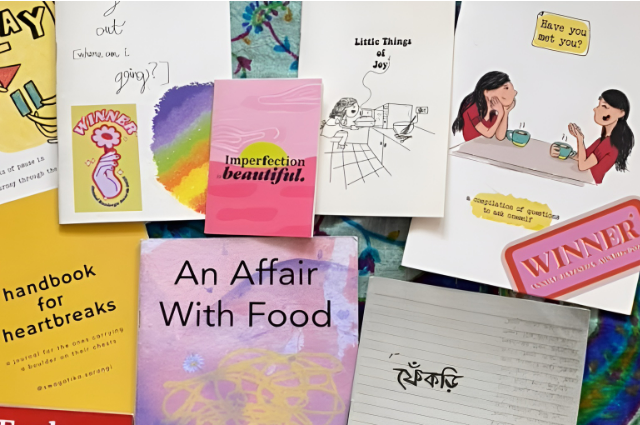
Ano Patel stepped into the strange and wonderful world of zines unexpectedly.
She had changed upon the hashtag #zines in 2019 and begun following it, growing more and more attracted to the medium.
She became the founder of Bazinega, House of Zines, an online zine marketplace and independent publishing houses for zines.
During COVID-19, she found herself in a doom-scrolling and going through zines from all over the world. She ordered a lot of zines during the pandemic. She created her own zine in 2021 in collaboration with women all over the world.
The zine, she says, was about spotting the first grey hair on the head, a theme explored through anecdotes, illustrations and even fiction.
Once everything was ready, she found it difficult to distribute it. She herself reached out to some independent stores in Bengaluru if they would stock zines. It was a long and tiring process and got many rejections through.
When she had a word with other zine makers, she realized that it was a common problem. People mostly used to sell their zines on social media.
It was realised that all the zinesters needed a platform where they could collaborate and showcase their work.
Over the last 10 months, Bazinega which started it's journey with 14 artists from across 10 cities and 47 zine titles has expanded considerably.
The platform has also participated in pop-ups, expanded it's product base, held zine awards, started a poetry reading club, and launched a monthly subscription plan and other things, etc.
And now it is all set to invite more people to the medium. Bazinega will be hosting a 'Zine Scene' zine festival in Bengaluru on June 17th and 18th. Visitors attending this event will not only be privy to a collection of over 60 zines created by 16 artists from all over India but can also register for workshops and storytelling. The main aim is to create more storytellers and more zine readers.
While some historians claim the 'Ninety-Five Theses' nailed at the door of the Catholic Church by German monk, Martin Luther in 1517 appeared as a zine too. The first zine appears to have emerged in the 1920s and 1930s.
People would write about their favourite band and distribute it within their circles. As an aspect of counter-culture movements, hand-made magazines constitute a significant sphere.
Zines have evolved and changed their form over the years. The cultural artifacts have a huge part of it's charm. It is such a unique medium of storytelling with each of them being different.
Patel believes that everyone has a story to tell and zines are a perfect medium for this. She adds pointing out that since zines are self-made and self-published, they are not limited by censorship or the vagaries of the publishing industry. There is no dependence on external factors and one can easily go ahead with it.
She hopes to talk more about what zines are and make them an everyday read. This means that the scope of zines is expansive and limitless.
. . .
Reference:
- thehindu.com
